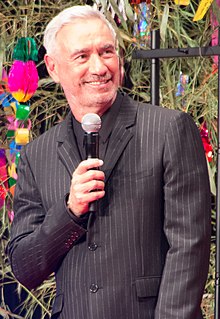A Quote by Paul Romer
Yeah, but look, who really provided the world's information to everybody on Earth? That was Wikipedia, right? And if you're asking what could we do to make the digital world work for people, the Wikipedia model is great. It's a donation model.
Related Quotes
Now in Wikipedia it's really interesting. If you put something incorrect up on Wikipedia within minutes there are people crawling all over that sentence saying, "This is wrong" or "I want to change this" or "You've got to include an amplification," et cetera. So there's this massive checks and balances that actually makes that accuracy work. This is the kind of model that we - and I'm not sure why no one's discussing this - that we now have to begin to apply to fake news.
The core community is passionate about quality and getting it right. If you want to read some good criticisms of Wikipedia, probably the best place to go is to the Wikipedia article called 'criticisms of Wikipedia'... It was either the dumbest thing or the smartest thing I ever did. The dumbest thing for the obvious reasons, but the smartest thing because I don't think it could have had nearly as much impact as it has. One of the key things that inspired people to put a lot into it (was the charity aspect).
I'm quite good at taking in information so I voraciously inhale Wikipedia - which may have some things wrong in it, but I think is generally more information than we had before. Last tour we didn't have Wikipedia. And then Discovery Channel and History Channel. I can take it in and retain what I think are the most important facts.
I don't really agree that most academics frown when they hear Wikipedia. Most academics I find quite passionate about the concept of Wikipedia and like it quite a bit. The number of academics who really really don't like Wikipedia is really quite small and we find that they get reported on in the media far out of proportion to the amount they actually exist.
A lot of times, professional athletes say, 'I'm not a role model; I'm an athlete.' I don't mind being a role model because I know what I've done in order to make it to where I am right now. It's a lot of hard work; it's a tremendous amount of hard work. But in order to be make it to a certain level, everybody knows it's going to take time.



































